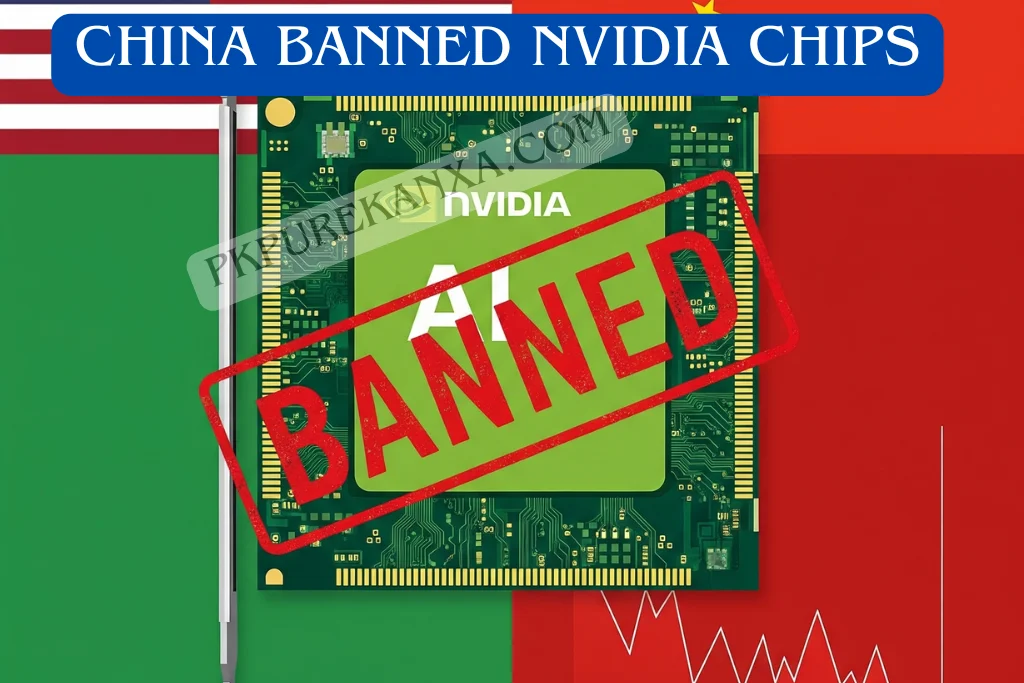In a bold move, China’s Cyberspace Administration (CAC) has banned major tech firms, including Alibaba and ByteDance, from purchasing Nvidia’s AI chips. The order targets the RTX Pro 6000D and H20 models, both designed for export compliance. The announcement triggered immediate global reactions, with Nvidia stock sliding 2.6% intraday and analysts warning of accelerated tech decoupling between Washington and Beijing. The decision underscores a pivotal moment in the US-China chip war, as China signals growing confidence in its domestic semiconductor industry.
What Triggered the Ban?
The roots of this ban stretch back years. The US restricted exports of Nvidia’s most advanced AI chips to China under national security concerns. In response, Nvidia engineered downgraded versions like the H20 and the RTX Pro 6000D specifically for Chinese clients.
In August 2025, the Trump administration struck a deal with Nvidia: in exchange for selling certain chips to China, 15% of those sales would flow back to the US government. But Beijing’s latest move overrides that agreement, highlighting its determination to reduce reliance on American technology.
Affected Chips and Companies
China’s directive impacts some of the country’s biggest tech firms, which had been early adopters of Nvidia hardware for generative AI training and deployment.
| Chip Model | Key Features | Status in China |
|---|---|---|
| H20 | Downgraded A100 equivalent for export compliance | Purchases halted; existing orders terminated |
| RTX Pro 6000D | Custom AI accelerator designed for Chinese market | Banned from testing and buying |
Affected firms: Alibaba, Tencent, ByteDance, and Baidu.
Nvidia’s Response and Market Impact
Nvidia CEO Jensen Huang said Wednesday:
“We can only be in service of a market if the country wants us to be. I’m disappointed, but understanding of the larger agendas at play.”
The ban is yet another hit to Nvidia’s China business, which Huang has described as “a roller coaster.” Analysts estimate that China accounts for 20–25% of Nvidia’s data center revenue, making the move highly significant for investors.
- Market reaction: Rival chipmakers in China gained, with Huawei’s semiconductor division surging in valuation.
- Stock impact: Shares dipped by 2.6% intraday following the FT report.
China’s Domestic Alternatives
China’s semiconductor champions are stepping in to fill the void. Companies like Huawei, Cambricon, and Birentech are developing advanced GPUs that Chinese officials claim are already competitive with Nvidia’s offerings.
Beijing’s broader industrial policy aims to triple domestic chip production capacity by 2026, heavily subsidized by state-backed funds. The ban on Nvidia may act as both a protectionist measure and a way to accelerate domestic adoption.
Geopolitical Ramifications
The timing is telling. President Donald Trump is on a state visit to the UK, and a Trump–Xi Jinping phone call is expected Friday. Analysts suggest the ban could be Beijing’s bargaining chip in ongoing negotiations over tariffs, technology, and even TikTok’s ownership.
US House Speaker Mike Johnson said:
“China is straining U.S. relations with Nvidia chip ban.”
The move also comes days after China’s regulators opened an anti-monopoly probe into Nvidia’s acquisition of Mellanox, adding further pressure on the company.
China’s decision to ban Nvidia’s AI chips is more than a corporate setback — it’s a turning point in the global tech war. By prioritizing domestic alternatives, Beijing is accelerating chip independence but also risking a fragmented AI ecosystem that could slow cross-border innovation.
The big question now: will this ban hold, or is China merely leveraging Nvidia as a pawn in its negotiations with Washington?


